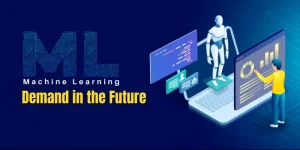
Updated on: August 14, 2024
In today’s fast-paced technological landscape, Artificial Intelligence (AI) and Machine Learning (ML) have emerged as transformative forces, reshaping various sectors from healthcare to finance. These advanced technologies drive innovation and open up new possibilities for solving complex problems and enhancing our daily lives. Whether you’re contemplating a career in this exciting field or just curious about its potential, understanding AI and ML’s fundamentals and their future impact is crucial. This blog delves into the essence of Learn Artificial Intelligence and Scope of Machine Learning and how you can embark on your learning journey with the right resources.
What is Artificial Intelligence?
Artificial Intelligence (AI) refers to the capability of a machine to imitate intelligent human behavior. This includes problem-solving, reasoning, learning, and understanding natural language. AI systems are designed to perform tasks that typically require human intelligence. These tasks can range from recognizing spoken words to interpreting visual data, making decisions, and even interacting with users naturally.

AI is a broad field that encompasses various sub-disciplines, including:
- Natural Language Processing (NLP): Enables machines to understand and respond to human language.
- Robotics: Focuses on designing and building robots that can perform tasks autonomously.
- Computer Vision: Allows machines to interpret and make decisions based on visual data from the world.
- Image detection: It is the process of finding and studying things in pictures to get useful information.
Understanding Machine Learning
Machine Learning (ML) is a specialized area within AI that deals with developing algorithms that allow computers to learn from and make predictions or decisions based on data. Unlike traditional programming, where explicit instructions are provided, ML enables systems to improve performance by learning from data patterns and experiences.
The core idea of Machine Learning Demand in Future is to build models that can automatically learn and adapt from data without human intervention. This involves:
- Supervised Learning: Where the model is trained on a labeled dataset, meaning that each training example is paired with an output label. The goal is to learn how to map inputs to outputs.
- Unsupervised Learning: Involves training a model on data without labeled responses. The model tries to find hidden patterns or intrinsic structures in the input data.
- Reinforcement Learning: Focuses on training algorithms to make decisions by rewarding desired behaviors and penalizing undesired ones.
The Importance of AI and Machine Learning
The impact of AI and ML is profound and widespread. Here are a few examples of how these technologies are revolutionizing various industries:
- Healthcare: AI-powered diagnostic tools can analyze medical images and detect diseases at early stages, potentially saving lives. Predictive models can also forecast patient outcomes and personalize treatment plans.
- Finance: Machine learning algorithms are used for fraud detection by identifying unusual patterns in transaction data. They also enhance risk management and automate trading strategies.
- Retail: AI-driven recommendation systems analyze customer behavior and preferences to offer personalized product suggestions. This enhances the shopping experience and increases sales.
- Transportation: Autonomous vehicles use AI to navigate roads and avoid obstacles, while ML models optimize traffic management and route planning.
How to Get Started with AI and Machine Learning
If you’re eager to explore the world of AI and ML, there are several pathways you can take. Here’s a guide to help you get started:
- Artificial Intelligence Training Course: Enrolling in an AI training course is a great way to gain a structured understanding of AI concepts and applications. These courses typically cover fundamental topics such as machine learning algorithms, neural networks, and data analysis techniques. They often include hands-on projects to help you apply what you’ve learned.
- Machine Learning Course: For those specifically interested in ML, a specialized machine learning course can provide deeper insights into various ML techniques and tools. Topics might include supervised and unsupervised learning, model evaluation, and advanced algorithms like deep and reinforcement learning.
- Artificial Intelligence Tutorial: Online Artificial Intelligence Tutorial offer a self-paced learning experience and can be an excellent way to supplement your formal education. These tutorials often include video lectures, interactive exercises, and practical projects to help you understand and apply AI concepts effectively.
- Top 10 Projects of Artificial Intelligence: Engaging in real-world projects effectively builds practical skills and showcases your expertise. Projects such as creating a chatbot, developing a recommendation system, or implementing image recognition models provide hands-on experience and demonstrate your ability to apply AI techniques to solve real problems.
Event Link:- Upcoming Trending Event
Exploring the Scope of Machine Learning
The scope of machine learning is extensive and continually expanding. ML technologies are applied to various domains, leading to innovative solutions and improved decision-making. Here are some key areas where ML is making a significant impact:
- Predictive Analytics: ML models analyze historical data to predict future events. This is used in various fields, including finance for forecasting stock prices and healthcare for predicting patient outcomes.
- Automated Decision-Making: ML algorithms help automate complex decision-making processes by analyzing large volumes of data and identifying patterns that might not be evident to human decision-makers.
- Natural Language Processing (NLP): ML enhances NLP capabilities, allowing machines to understand and generate human language more effectively. This is used in virtual assistants, translation services, and sentiment analysis applications.
- Image detection: ML methods for image detection let computers recognize and categorize items in visual data for face recognition and self-driving cars.
Creating a Machine Learning Roadmap
To navigate the field of ML effectively, creating a Machine Learning Roadmap can be immensely helpful. This roadmap serves as a guide to acquiring the skills and knowledge necessary for success in ML. Here’s a suggested roadmap:
- Learn Programming Fundamentals: Start by learning a programming language commonly used in ML, such as Python or R. Familiarize yourself with data structures, algorithms, and basic programming concepts.
- Study Mathematics and Statistics: A solid understanding of mathematics and statistics is essential for ML. Focus on linear algebra, calculus, probability, and statistical methods, which form the foundation of many ML algorithms.
- Understand Machine Learning Algorithms: Study various ML algorithms, including linear regression, decision trees, support vector machines, and neural networks. Learn how these algorithms work and when to use them.
- Practice with Real Data: Gain hands-on experience by working on real datasets. Participate in data science competitions, contribute to open-source projects, or use public datasets to build and evaluate ML models.
- Explore Advanced Topics: Once you have a solid foundation, delve into advanced topics such as deep learning, reinforcement learning, and natural language processing. These areas offer more specialized knowledge and applications.
Machine Learning Demand in the Future
The Machine Learning Demand in Future is projected to increase significantly. As more industries adopt AI and ML technologies, the need for skilled professionals will grow. Here’s why:
- Industry Adoption: Organizations across sectors are integrating ML to enhance their operations, improve customer experiences, and drive innovation. This growing adoption increases the demand for ML experts who can develop and implement effective solutions.
- Data Explosion: The rapid growth of data and the need for advanced analytics fuel the demand for ML professionals. Companies require expertise to analyze vast amounts of data and extract actionable insights.
- Technological Advancements: As ML technology evolves, new applications and opportunities will emerge, creating a continuous need for professionals who stay updated with the latest developments.
- Data Engineering and Data Mining: Data engineering and data mining become increasingly important as ML projects get more complicated. These experts manage and prepare data for analysis to provide reliable and well-structured datasets for ML models.

Conclusion
The potential of AI and Machine Learning is vast, offering transformative solutions across various domains and opening up exciting career opportunities. You can embark on a rewarding journey in this dynamic field by understanding the fundamentals of AI and ML, exploring the scope and applications, and engaging with relevant resources such as Artificial Intelligence training courses and Machine Learning courses.
Whether you’re just starting or looking to advance your skills, there are numerous ways to get involved. From exploring Artificial Intelligence tutorials to tackling the Top 10 Projects of Artificial Intelligence, each step you take will enhance your knowledge and position you for success in the future.
Suppose you’re ready to dive into AI and ML, leverage available resources, and pursue learning opportunities that align with your interests and career goals. Embrace the challenge, stay curious, and unlock the full potential of AI and ML. For more information and resources on AI and ML, visit www.ssdntech.com or enroll in one of our recommended courses.






